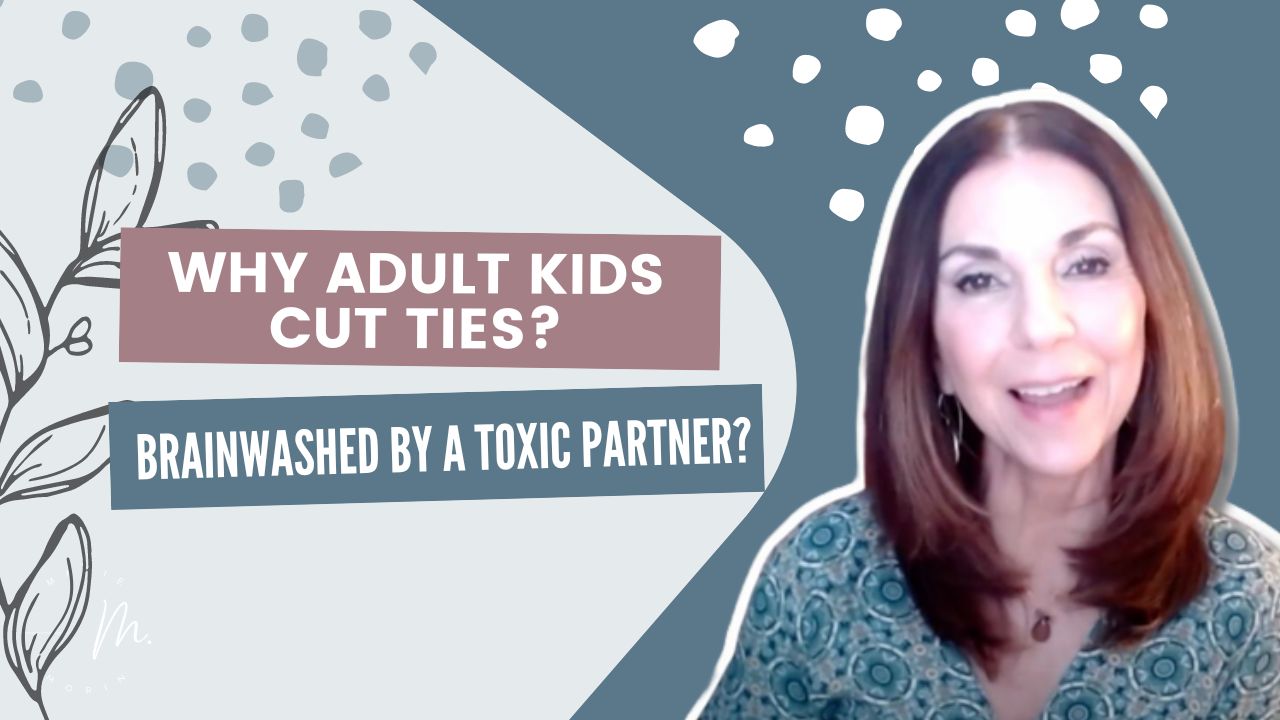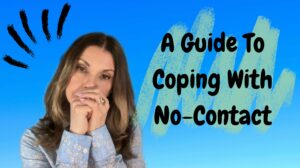Estrangement is the condition that describes when a family member distances themself from other family members. This cut-off can be emotional or physical separation; often, it is both. The family rift creates emotional angst in all parties. The estranged can feel grief, feelings of shock, bargaining, guilt, anger, and depression.
Adult children sometimes estrange due to pressure from a spouse or partner. This article discusses: Why Adult Children Cut Ties? Are they Brainwashed By A Toxic Partner?
When adult children marry or gain a partner whose behaviors clash with their family, there are winners and losers. According to Dr. Joshua Coleman, author of the book Rules of Estrangement, adult children have an “asymmetrical balance of power.” Your adult child is motivated to avoid conflict in their domain, so parents get the boot. The adult child, linked to a toxic partner, has little choice if his partner demands loyalty. Unfortunately, this scenario is more common than you think. The toxic partner wins due to their controlling, superior posture using angry emotional outbursts. The adult child surrenders the fight to keep some semblance of peace.
Is Your Adult Child Brainwashed?
Brainwashing is when there is consistent pressure on someone to adopt distinctively different beliefs employing systematic pressuring and forcible coercion. Toxic behaviors are controlling, manipulative, and emotionally demanding.
Adult children who may have a partner or spouse with high expectations who is verbally dissatisfied are vulnerable. Consider the selfish and contemptuous behaviors that affect a spouse. Interestingly, research demonstrates that men are vulnerable to wives who pressure them. Men are likely to avoid conflict at all costs, including resorting to estranging from family.
Gatekeeper
Coleman explains that in some cases, the adult child’s partner becomes the gatekeeper. The toxic partner becomes the sole messenger and insists that communication only goes through them. In time, the adult child submits and mimics their partner’s behaviors.
The toxic partner may also inform the parent of their poor parenting and a list of offenses. Parents wonder what has happened to their adult child’s voice. They are concerned their son or daughter refuses to speak. Communication must go through the toxic partner.
A Cult Of One
Coleman explains that partners are similar to cult leaders, expecting absolute cooperation. Partners can insist that evil parents raise your adult child. When parents are, in fact, abusive, this can make sense. However, this manipulation is effective in functional homes, especially when the adult child and parents have enjoyed a very close relationship.
There may have been significant problems in the adult child and parent relationship, and the spouse uses this knowledge to gain control and manipulate. Also, any adult child is vulnerable when pressured by a troubled spouse.
What A Troubled Spouse Can Encourage An Adult Child To Think
- They have repressed memories of abuse or a bad childhood
- Adult child is too dependent on their parents and needs to stick up for themselves.
- The parent’s behaviors are currently abusive or problematic. The attempts to determine why the adult child has cut off is evidence of the problem.
- The partner will inflate any typical family interchange into unacceptable parental behaviors that should not be tolerated.
- Any positive contact with the parent or family member is reframed to continue manipulation. The partner undermines family closeness since this will impinge on the partner’s ability to influence power and control over the adult child.
Coleman’s Similarities Of Partners To Cult Members
- A sudden or dramatic change in beliefs and personality.
- Childhood history is rewritten to lousy parenting or abuse.
- The cult member uses language that is out of character.
- Cult members reject parents, siblings, and anyone close to them.
- Cult members reject their past, even memories that are cherished
- Secrecy
- Cult members have powerful belief systems
- A radical change in their life plan
Cult tactics are similar to what we experience daily to get us to shop, vote, or join something. With persistent influence at great intensity, cults can manipulate anyone, especially the vulnerable and those isolated, to act in hurtful ways to others.
Highly manipulative individuals can use someone’s insecurities, for example, to help them to feel better about themselves. On the other hand, they can employ their keen ability to know their partner’s needs and use their insecurities against them to exert power and control.
Why Adult Kids Cut Ties
Adult children estrange for many reasons, including parents’ divorce, differing values, and life choices, parental alienation, mental illness, addictions, and being overly dependent on parents. They may be so emotionally stressed that it is challenging to be in the company of their parents.
Adult children cut ties to preserve their well-being when there is a history of abuse, toxic parenting, and betrayal. There may have been highly dysfunctional behaviors. Rarely is there one reason but a combination of stressors impacts the decision to estrange.
The emotional and physical distance can overwhelm parents of estranged adult children. Parents experience grief and struggle to find normalcy. Many suffer in silence. Estrangement is present in more than a quarter of the United States population.
More individuals are coming out of the shadows to find relief from this silent family epidemic.
Adult children who partner with or marry a troubled individual are vulnerable to the toxic behaviors that precede estrangement. Often, the partner’s slow but seemingly deliberate acts lessen contact with parents. Coleman describes the similarities with cult members who forcibly coerce adult children with consistent pressure. This article discusses Why Adult Kids Cut Ties? Are they Brainwashed By A Toxic Partner?
Resources:
Agllias, Kylie. Family Estrangement A Matter Of Perspective. New York, Routledge, 2017.
Coleman, Joshua. Rules of Estrangement. New York, Harmony Books, 2020.
Morin, Marie. Feeling Heartbroken and Alone? How to Pick Up the Pieces When You are Estranged. eBook. 2022.
Morin, M.L. [Morin Holistic Therapy]. (2022, January 4 ). What is Family Estrangement? You Are Not Alone.
Morin, M.L. [Morin Holistic Therapy]. (2021, September 8). Diaphragmatic Breathing: 5-Minute Deep Breathing Exercise for Beginners.
Morin, Marie. How to Deal with Estranged Family During the Holidays (2021, November 21) Sixty and Me. https://sixtyandme.com/estranged-family-holidays/
Pillemer, Karl. Fault Lines Fractured Families and How to Mend Them. New York Penguin Random House, 2020.








